Obama news conference uncertain during his three days in Beijing奧巴馬新聞發布會期間,他在北京的3天不確定
- Beijing balks at proposal for joint news conference with U.S., Chinese presidents
- "So we want it; they don't. They are the host. That's where we end up," analyst says
- Obama will also visit Myanmar and Australia during his Asia trip this week
Beijing (CNN) -- Even as President Obama is expected to raise the issues of democratic rights and press freedoms during a trip to China this week, there is a question whether he will hold his own news conference with reporters covering his three-day stop in Beijing.
White House officials accompanying Obama cautioned leaders in Beijing are still balking at the U.S. proposal for a joint news conference with Chinese President Xi. But consultations with Chinese officials continue on the issue, aides said.
"No final word," one senior administration official said.
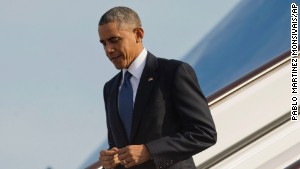
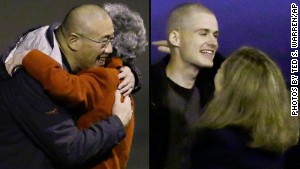
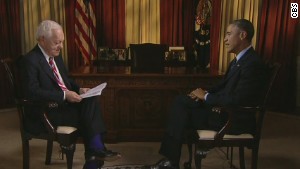
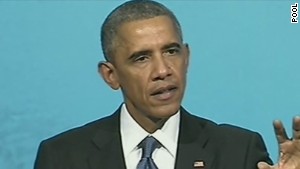
A separate official stressed the President may go forward with his own news conference, without Xi, a move that may add pressure to already tense U.S.-Chinese relations.
Obama administration officials prepared reporters for the possibility of limited access to Obama during a background briefing with reporters last week. Reservations among Chinese officials were cited as the sole reason for potential press restrictions.
"If you go back to when Chinese leaders have agreed to joint press availabilities, you'll have a very hard time finding one where they have been willing to take questions from the press," said Brookings Institution analyst Ken Lieberthal at a briefing on the President's trip last week.
"So we want it; they don't. They are the host. That's where we end up," Lieberthal added.
Joint news conferences are a norm for U.S. presidents as they travel much of the world. Generally, Obama and foreign leaders will engage in a news conference described as "2+2" with journalists, meaning two questions each from U.S. and foreign reporters. But there are rare exceptions, such as Obama's visit to Saudi Arabia earlier this year.
National Security Advisor Susan Rice raised the issue of press access with her Beijing counterparts in the weeks leading to the President's visit, which will include a formal bilateral meeting with Chinese President Xi at a summit of APEC leaders.
The President is scheduled to deliver a speech to the CEOs gathered at the APEC summit Monday.
Obama and Xi will have "candid and in-depth conversations" on a range of issues, Rice told reporters last week. In addition to their meeting, both leaders will deliver statements to the media. But the possibility of taking questions remains the sticking point.
Press freedom and human rights in China remain a major concern for the United States, White House officials said. Recent democracy protests in Hong Kong have only served to elevate the issue for Obama, aides said.
"We've been very clear about our views and concerns about Hong Kong and other aspects of human rights and civil liberties in China, as we have been elsewhere," Rice said.
Unlike other recent trips abroad for Obama, he is not scheduled to meet with human rights activists or engage in other "person to person" events while in China. He is on a tight time line, administration officials explained.
Aides said the President will hold a town hall with young Burmese in Myanmar, during the second stop of Obama's three-nation tour which ends at the G-20 summit in Australia later this week.
The threat posed by Chinese hackers to U.S. businesses will also figure prominently in talks between the two leaders.
"With respect to China, clearly the issues of cybersecurity will be prominent on our bilateral agenda. This is a source of grave concern to the United States," Rice said Friday.
"We have reiterated on every occasion the fact that we oppose any efforts -- official or unofficial -- to engage in cyberespionage for commercial gain or other purposes," she added.
Obama and Xi have fielded questions from reporters in the past, but on U.S. soil.
At a joint news conference in California last year, Xi was pressed by an American reporter on the issue of cybersecurity. Xi responded China has its own concerns with hackers.
"China is a victim of cyber attacks, and we hope that earnest measures can be taken to resolve this matter," Xi said last year.
奧巴馬新聞發布會期間,他在北京的3天不確定
由吉姆·阿科斯塔,CNN
2014年11月10日 - 更新2043 GMT(0443 HKT)
新聞提要
北京不太願意提議聯合新聞發布會上與美國,中國總裁
“因此,我們希望它;他們不,他們是在主機這就是我們最終,”分析師說
奧巴馬還將訪問緬甸和澳大利亞在這個星期他的亞洲之旅
北京(CNN) -即使奧巴馬總統預計將訪問中國,本週中提出的民主權利和新聞自由的問題,還有一個問題,他是否將舉行自己的新聞發布會採訪的記者在為期三天停在北京舉行。
白宮官員陪同奧巴馬警告在北京的領導人仍猶豫不決的美國提案的聯合新聞發布會上與中國習主席。但是,與中國官員磋商繼續在這個問題上,助手說。
“沒有一錘定音,”一位高級政府官員說。
奧巴馬需要在亞洲外交政策 PRES。奧巴馬對美國人質釋放 奧巴馬:“我必須承擔責任” 奧巴馬:美中中國的夥伴關係有助於世界
一個單獨的官員強調,總統可能會繼續推出自己的新聞發布會上,而不習,這可能會增加壓力,本來就緊張的美中關係,中國的舉動。
奧巴馬政府官員準備記者對在背景簡報與記者上週有限的訪問對奧巴馬的可能性。中國官員中保留被列為潛在的新聞限制的唯一原因。
“如果你回去的時候,中國領導人已同意聯合記者可用性來,你就會有一個非常困難的時期找到一個,他們都願意接受來自記者的提問,說:”美國布魯金斯學會分析師李侃如在上一個簡報上週總統訪華。
“因此,我們希望它;。他們不,他們是在主機這就是我們最終,”李侃如補充說。
聯合新聞發布會是一個常態的美國總統,因為他們遊世界大部分地區。一般情況下,奧巴馬和外國領導人將進行描述為“2 + 2”與記者的新聞發布會,這意味著來自美國和外國記者的兩個問題每個。但也有少數例外,如今年早些時候奧巴馬訪問沙特阿拉伯。
國家安全顧問蘇珊·賴斯和她的北京同行在通往總統的訪問,其中包括在APEC領導人峰會的正式雙邊會晤習中國國家主席對週提出的按訪問的問題。
總統計劃發表講話,向聚集在APEC峰會上週一的老總。
奧巴馬和習會“坦誠,深入的對話”的一系列問題,賴斯對記者說的最後一周。除了會晤,雙方領導人將發表聲明向媒體。但服用問題的可能性仍然是癥結所在。
新聞自由和中國的人權仍然是美國一個主要問題,白宮官員說。香港最近的民主抗議活動,只起到了提升的問題奧巴馬的助手說。
“我們已經很清楚我們在中國的看法和擔憂香港和人權等方面和公民自由,因為我們已經在其他地方,”賴斯說。
與最近的其他車次國外奧巴馬,他沒有安排會見人權活動或從事其他“人對人”的事件,而在中國。他是在緊張的時間線,政府官員解釋說。
奧巴馬的助手說,總統將舉行市政廳與緬甸青年在緬甸,在奧巴馬的3國之行的第二站這在G-20峰會在澳大利亞本週晚些時候結束。
中國黑客對美國企業造成的威脅也將在兩國領導人的會談中顯得很突出。
“對於中國,網絡安全的明確的問題將是我們的雙邊議程上突出的,這是嚴重關切美國的來源,”賴斯說,星期五。
“我們重申對每一個場合,我們反對任何努力的事實 - 官方或非官方 - 從事網絡間諜謀取商業利益或其他目的,”她補充說。
奧巴馬和習已派出在過去的記者提問,不過在美國本土。
在加利福尼亞州,去年的聯合新聞發布會上,習近平是在網絡安全問題上按下了一個美國記者。夕回答中國有自己的憂慮與黑客的攻擊。
“中國是網絡攻擊的受害者,我們希望能夠採取切實措施解決這一問題,”習近平說,去年。
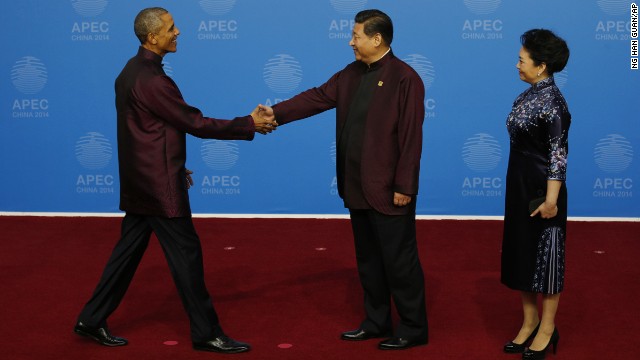



 留言列表
留言列表
 {{ article.title }}
{{ article.title }}

